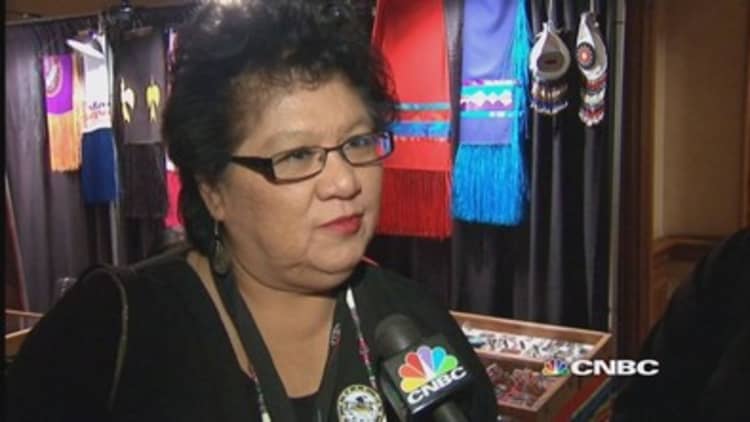
Some Native American tribes have done very well for themselves in the casino business. But for tribes whose lands are far off the beaten track, that business won't work. Finding new economic opportunities can be difficult.
Many are being encouraged to look for jobs in the energy sector or develop e-commerce ventures, but some are being told they could make millions of dollars using wide open spaces on reservation land growing a very lucrative crop: marijuana.
This month in Las Vegas, the National Center for American Indian Enterprise Development held a reservation economic summit. In a standing-room-only breakout conference at Mandalay Bay, tribal leaders listened to the pitfalls and opportunities of growing cannabis
Read More Medical marijuana business may have met its match
"We've been approached by several companies wanting us," said Priscilla Blackhawk Rentz, a councilwoman for the Mountain Ute tribe in Colorado, a state where marijuana is legal. She was at the conference to get more information about growing and selling pot in the Colorado market. "They're telling us that we could possibly create $3 million a year for our tribe alone."
There are 566 recognized tribes in the United States, and there are almost as many opinions about the marijuana business. "The Navajo will never do it, they're too conservative," one man told me.
Alcohol and drugs are already problems on many reservations. "Is marijuana going to add to those realities?" asked Mountain Ute councilwoman Deanne House.
Some tribes within Washington state, where marijuana is also legal for medical and recreational purposes, have banned pot on the reservation, "and others are looking at going into the business," said Charles Galbraith, a former federal prosecutor and member of the Navajo Nation who now consults with Washington tribes.
The possibility of growing marijuana popped up in December, when the Justice Department surprised tribal leaders with a memorandum suggesting that the agency may consider looking the other way if tribes got into the cannabis business, in much the same way it's backed off enforcement in states that have legalized pot, as long as certain rules are followed.
Read More Marijuana may be less harmful than alcohol, tobacco
The feds recommended that tribal leaders meet with their local U.S. Attorney "on a government-to-government basis," adding that "each United States Attorney must assess all of the threats present in his or her district, including those in Indian Country, and focus enforcement efforts based on that district specific assessment."
"This was definitely not a blanket legal authorization," said Lael Echo Hawk, an attorney working with tribes in Washington state. She said, however, that the market potential for tribes is huge. Beyond growing marijuana as a drug, Echo Hawk said tribes could take advantage of the industrial hemp market, which comes from the same plant. The U.S. is already importing $500 million in hemp, since U.S. farmers are still not allowed to grow it, and the plant is used in a variety of products.
Galbraith stressed that tribes should get into the cannabis business only if they are located in states where pot is legal. That would give them an "extra level of protection" if the Justice Department were to decide to crack down. For example, if the feds were to move against tribes inside Washington state, Galbraith said, "they'd also have to go after Governor (Jay) Inslee," the Democrat who helped steer the state toward legalization.
Some investors are waiting for tribes to give them the green light. "People are saying this is going to be bigger than bingo," said Leslie Bocskor of Electrum Partners. His firm would like to help tribes set up a banking system for the marijuana industry.
Read MoreCNBC Top States for Business 2014: Colorado
"If there's a way that we can find to create a financial institution that can be an acquiring bank, that can clear credit card transactions by using the sovereignty that's available to Native Americans, we believe that that would be an extreme game-changer that is unparalleled in the industry," Bocskor said.
But there are problems with riding the green wave.
One is that some reservations spread across state lines. The Mountain Ute's tribal lands spread across Colorado into New Mexico and Utah, where marijuana is still illegal. "We may be a tribe and have our sovereign rights, but what happens once they cross the border?" asked Councilwoman House.
Problems are also cropping up even within states where medical marijuana is legal. In California's Mendocino County, the Pinoleville Pomo Nation has contracted with FoxBarry Farms in Kansas to build a $10 million grow operation. Plans are on hold, however, as the Mendocino County sheriff says the operation may violate local law.
Read More Marijuana edibles set for kosher certification
Then there are concerns marijuana could add more problems than it solves. Attorney Robert Odawi Porter, former president of the Seneca Nation in New York, claims data show the social cost of legal marijuana is only 12-28 percent of the social cost of alcohol, that is, the fallout created like violence, crime or driving under the influence.
"You can't ignore that. At worst, you're moving alcoholics to being stoners, and you're improving life for the rest of the people in society," he told the crowd.
One person who's hoping tribes don't focus too heavily on the potential of pot is Gary Davis, CEO of the enterprise development center that ran the summit and a member of the Cherokee Nation of Oklahoma. "We have to look at the opportunity, but it's not as simple as just, 'Let's go sell marijuana,' or 'Let's get into that marijuana sector,' and do we want to," he said.
He emphasized that just because Justice Department said it might allow American Indians to grow pot, "there are so many things out there that make billions and billions of dollars."


